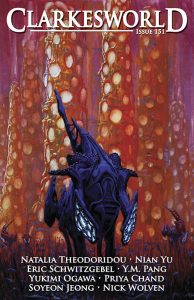Karen Burnham Reviews Short Fiction: Clarkesworld, Apex, Capricious, Apparition, and Aurealis
 Clarkesworld 4/19
Clarkesworld 4/19
Apex 3/19
Capricious SF #11
Apparition #5
Aurealis #119
April’s Clarkesworld brings us the first in a planned run of stories translated from Korean, starting with “The Flowering” by Soyeon Jong (translated by Jihyun Park & Gord Sellar). This is a sly story told in interview style, with the sister of a known subversive who’s been working to literally ‘plant’ organic biotech routers to get around government censorship. While the sister complains about what it’s like to live under such strict scrutiny, we get the backstory – and also her own role in the titular Flowering, the reason she’s being interrogated. The sister’s voice is very well done, seemingly casual while being completely in control of what she conceals and reveals.
There’s a lot of biohacking going on in this issue. “Ripen” by Yukimi Ogawa features a very controlled society where the “colored” have status over the “colorless” – yet Madame Enamel goes to two colorless Craftspeople for help when her skin begins to crack. This isn’t strictly legal – they’re supposed to transfer patterns for objects, not people – and a foreign anthropologist becomes involved and then the police…. If some of the premises are a little vague, that’s forgivable in a story that packs in a lot of plot and worldbuilding. “Social Darwinism” by Priya Chand features a woman whose mother gave her a “need attention” genemod in vitro, a drive she fulfills by taking on a variety of internet personas (most of them sexual). A campaign is started to make her a poster girl for banning these kinds of genetic modifications in fetuses, and it’s interesting to see all the conflicting pressures acting on the character: from her mother, the PR do-gooders, the need for attention, and her own sense of herself. Obviously our present is often strongly mediated by social media and many stories are stepping up to address this; Chand finds an interesting angle to take this to extremes. Moving even farther towards the post-human end of the spectrum, “In Search of Your Memories” by Nian Yu (translated by Andy Dudak) brings us Liang Sheng, born in 1987 and trying to recover something, some memory or person, that he lost when he uploaded his consciousness. The bureaucrat trying to help him can tell something’s up, and even sacrifices some of their own real world vacation time working on the case; the mystery unfolds toward a conclusion that’s satisfying for us, if not for Mr. Liang.
My favorite stories in the March issue of Apex have to do with neurohacking, after a fashion. The most ambitious is Elana Gomel‘s “The Prison-House of Language“. The narrator is a woman for whom any kind of speech results in real pain – not from the vocal chords but simply as a kind of synesthesia of language. Different languages strike her differently, and of course she becomes a linguist-for-hire: “I had reached my limit of pain-free speech and had no intention to continue unless I was paid, so I mutely ordered my AI to stop the car….” The case in the story has experimental subjects who have reached some sort of linguistic state never before seen, who then quickly succumb to a catatonic state. The narrative follows her on this case while also giving us her history as the child of UN workers, growing up internationally with all the up- and down-sides that entailed, especially for so unique a child. The Chomsky model of language gets a good showcase here as the case unfolds. The ending starts to go off the rails a little bit, but as a pure story-of-ideas I really appreciated this one. Russell Nichols‘ story “Curse Like a Savior” couldn’t have a more different tone. Imagine a near future where cheap holographic projectors can summon the wisdom of revered figures into your home (“Halograms”) – but they get glitchy sometimes. Our hero is a repair guy just looking to finish the job and head home, but finds himself, an atheist, being drawn into a woman’s arguments when he’s summoned to fix a Jesus module that’s been swearing. Possibly he shouldn’t have accepted her snacks…. How easy might it become to change someone’s mind (whether they like it or not)?
Capricious SF continues to choose stories that feature interesting blends of genres. In its eleventh issue, Penny Stirling‘s “Last Ocean Tide Lost in Sand” uses both SF and folklore in an unusual way. It features a robot watching terraforming efforts, which it had kicked off when it was the AI of a generation starship, coming undone. The robot is trying to triage the damage and keep the villagers under its care afloat, and it doesn’t appreciate it at all when news comes of an explorer thought lost, who has instead apparently been the guest of foxes – intelligent beings which the ship had considered barely better than vermin. However, their ways of thinking and of dreaming, may hold the key to healing the damage being done to the planet. The AI may not be able to see it, so she has to trust those in her care to walk down that path. The other story that stood out was “Treading Water” by Tapanga Koe. The premise is that a middle-aged man has been hiding his true nature his whole life: he’s suppressing a tentacular monster inside, and he knows that if it ever comes out he’ll likely be killed as a monster. The metaphorical moves in the story are obvious and this ground has been well trod, but this story just struck me as a particularly beautiful dramatization of a very important premise: sometimes when everything finally falls apart, there are people out there who will catch you.
The theme of the fifth issue of Apparition is Resistance, which takes the form of resistance to systems, villains, or nature. My favorite of the four original fiction pieces is “Who Defies the Watcher” by Aline-Mwezi Niyonsenga, a story about dragons and the activists who love them. In a world where any stray dragon is impounded and usually quickly sold for its skin (used in armor, among other applications), a young woman working on a legal dragon reserve finds a stray on her way to school. Hijinks ensue as she rescues it and ropes in her more privileged friend to try to keep it from being sold straight out of the pound. This is a well told, fun animal rights activist story, which foregrounds matters of race, class, and colonialism without ever bogging down the plot. I look forward to reading more from this new-to-me author.
Aurealis #119 leads with two stories of horror coming to those who dwell remotely. “In the Mountain Valley” by Gordon Grice features an isolated ranch and the hired hand who becomes a monster, and “Abomination” by Michelle Birkette brings us a young girl who is ostracized for her monstrous nature and the man who lives in the forest and takes her in. The last story is “Fracture Line” by Chris Walker, military SF in the quantum mechanics realm. In a world where the military has figured out how to use multiple universes to increase the odds of success in combat, the pilots who fly these cross-dimensional spacecraft are special, but of course they’re under the same pressures of hierarchy and missing families as any soldier. In the end Walker puts the classic SFnal idea of the same person existing in multiple realities to good use, although the story might have packed more punch with a little deeper characterization.
Recommended Stories
“The Prison-House of Language”, Elana Gomel (Apex 3/19)
“The Flowering”, Soyeon Jeong (Clarkesworld 4/19)
“Treading Water”, Tapanga Koe (Capricious SF #11)
Karen Burnham is an electromagnetics engineer by way of vocation, and a book reviewer/critic by way of avocation. She has worked on NASA projects including the Dream Chaser spacecraft and currently works in the automotive industry in Michigan. She has reviewed for venues such as Locus Magazine, NYRSF, Strange Horizons, SFSignal.com, and Cascadia Subduction Zone. She has produced podcasts for Locusmag.com and SFSignal.com, especially SF Crossing the Gulf with Karen Lord. Her book on Greg Egan came out from University of Illinois Press in 2014, and she has twice been nominated in the Best Non Fiction category of the British SF Awards.
This review and more like it in the June 2019 issue of Locus.
 While you are here, please take a moment to support Locus with a one-time or recurring donation. We rely on reader donations to keep the magazine and site going, and would like to keep the site paywall free, but WE NEED YOUR FINANCIAL SUPPORT to continue quality coverage of the science fiction and fantasy field.
While you are here, please take a moment to support Locus with a one-time or recurring donation. We rely on reader donations to keep the magazine and site going, and would like to keep the site paywall free, but WE NEED YOUR FINANCIAL SUPPORT to continue quality coverage of the science fiction and fantasy field.








